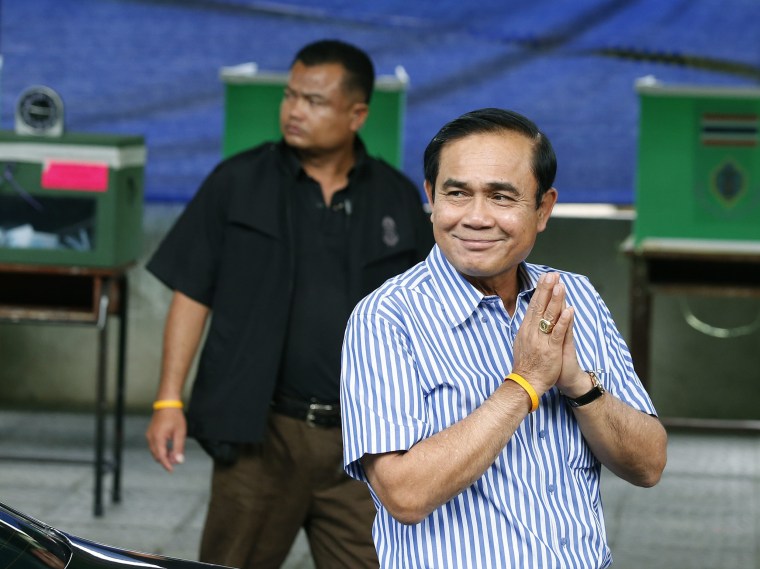BANGKOK— Thai voters on Sunday overwhelmingly approved a new junta-backed constitution that lays the foundation for a civilian government influenced by the military and controlled by appointed — rather than elected — officials.
Although near-final results showed that more than 60 percent of voters in a referendum called by the military government approved of the constitution, the vote is likely to be met by some skepticism, with the junta imposing severe restrictions on public discussion of the charter.
Ahead of the referendum, the junta — led by Prime Minister Prayuth Chan-ocha, a retired army general who has severely curtailed dissent since coming to power in a 2014 coup — banned political rallies and open discussion about the constitution, and criticism of the draft was made punishable by 10 years in jail.

Critics say the restrictions ensured that most people were unaware of the pitfalls of the charter, and were probably anxious to get the long-drawn process over with so they could move on.
The "yes" vote "adds that touch of legitimacy to the coup makers," Pavin Chachavalpongpun, an associate professor at the Center for Southeast Asian Studies of Kyoto University in Japan, told The Associated Press.
Related: Thais Vote on New Constitution That Could Dilute Democracy
"It gives them the green light for the next few steps they want to take. They will say the opposition cannot say anything now," said Pavin, who is Thai and a vocal critic of the junta.
Prayuth's office, however, said in a statement late Sunday that the referendum "was conducted with a high degree of transparency and openness on part of the government."
Despite the curbs on civil liberties, Prayuth's rule has brought a measure of stability and ended the frequent street violence and divisive politics that had frayed Thailand's social fabric for years. That veneer of stability could help explain the "yes" vote for the new constitution.
There was also the allure of new elections that Prayuth has promised to hold in 2017, after the approval of the new constitution, although he had said he would call the vote even if the referendum was defeated.
With 91 percent of the ballots counted, 62 percent of the voters said they approved of the constitution, while 38 percent rejected it, Election Commissioner Somchai Srisutthiyakorn told reporters. He said the result was not expected to change much after all of the votes are counted.
Only about 55 percent of Thailand's roughly 50 million registered voters cast ballots in the referendum.
Related: Gallery: Protests in Thailand
In addition to asking for an opinion on the constitution, the referendum also asked a supplementary question on whether voters wanted an appointed Senate to choose a prime minister. That question elicited a less enthusiastic approval — 58 percent "yes" and 42 percent "no."
Analysts have said that a "yes" vote on the constitution would be a setback for democracy in Thailand.
Pavin, the Kyoto University professor, said that even when the military is no longer in power and a civilian government is in place after the 2017 elections, the military "will have the constitution as a remote control. The constitution can be used as a device to hold onto political power."
Thailand has endured 13 successful military coups and 11 attempted takeovers since it replaced an absolute monarchy with a constitutional one in 1932. This would be Thailand's 20th constitution.